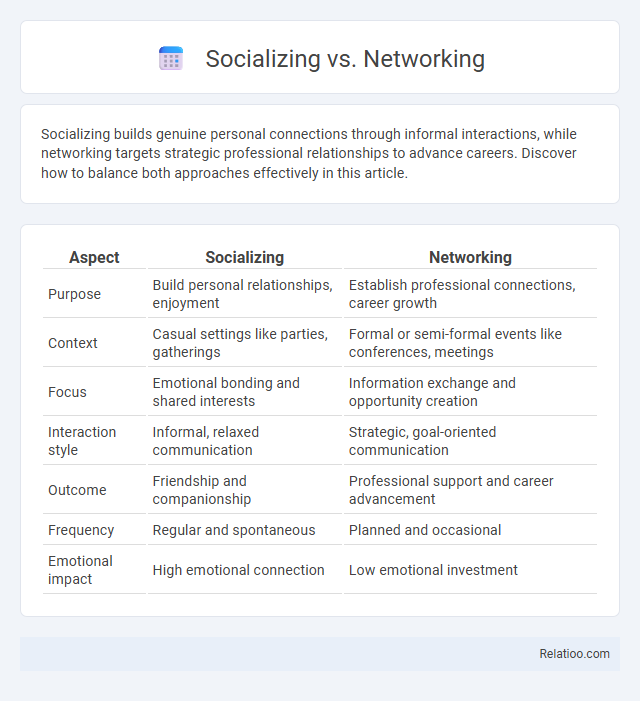Socializing builds genuine personal connections through informal interactions, while networking targets strategic professional relationships to advance careers. Discover how to balance both approaches effectively in this article.
Table of Comparison
| Aspect | Socializing | Networking |
|---|---|---|
| Purpose | Build personal relationships, enjoyment | Establish professional connections, career growth |
| Context | Casual settings like parties, gatherings | Formal or semi-formal events like conferences, meetings |
| Focus | Emotional bonding and shared interests | Information exchange and opportunity creation |
| Interaction style | Informal, relaxed communication | Strategic, goal-oriented communication |
| Outcome | Friendship and companionship | Professional support and career advancement |
| Frequency | Regular and spontaneous | Planned and occasional |
| Emotional impact | High emotional connection | Low emotional investment |
Understanding Socializing and Networking
Socializing involves informal interactions aimed at building personal relationships, while networking focuses on establishing professional connections to advance career goals. Understanding socializing helps develop genuine rapport and trust, which can enhance the effectiveness of networking efforts. Effective networking leverages these personal bonds to create mutually beneficial professional opportunities.
Key Differences Between Socializing and Networking
Socializing involves building personal relationships based on shared interests and casual interactions, while networking focuses on establishing professional connections to advance your career or business goals. Your networking efforts are usually goal-oriented and strategic, designed to create mutually beneficial opportunities, whereas socializing is more informal and centered on personal enjoyment. Understanding these key differences helps you leverage each activity appropriately for both professional growth and social fulfillment.
The Purpose of Socializing
Socializing primarily aims to build genuine personal connections and foster trust through informal, enjoyable interactions, enhancing emotional bonds and mutual understanding. Unlike networking, which concentrates on professional goals such as career advancement or business opportunities, socializing supports relationship foundation without explicit professional intent. The purpose of socializing lies in creating meaningful, enduring relationships that can later evolve into valuable professional networks.
The Goals of Networking
Networking is primarily focused on building mutually beneficial relationships that support career growth, business opportunities, and knowledge exchange. The goals of networking include expanding your professional contacts, gaining industry insights, and creating pathways for collaborations or job prospects. Socializing centers on personal enjoyment and connection without specific professional objectives, whereas networking requires strategic intent aligned with your career or business goals.
Personal Connections vs Professional Relationships
Socializing centers on building personal connections through casual interactions and shared interests, fostering trust and emotional bonds. Networking emphasizes establishing professional relationships aimed at career growth, knowledge exchange, and opportunities within industry circles. While socializing nurtures authenticity and long-term friendships, networking strategically cultivates contacts to advance business objectives and professional development.
Skills Needed for Effective Socializing
Effective socializing hinges on strong interpersonal skills such as active listening, empathy, and clear communication, which help You build genuine connections and foster trust. Mastering emotional intelligence enables navigating diverse social settings, enhancing Your ability to engage authentically without appearing transactional. Practicing these skills ensures that social interactions transcend shallow exchanges and create meaningful relationships essential for both personal and professional growth.
Strategies for Successful Networking
Effective networking strategies involve building genuine relationships through active listening, personalized communication, and consistent follow-up to create lasting professional connections. Your approach should emphasize offering value, attending industry events, and leveraging online platforms like LinkedIn to expand your network strategically. Prioritizing quality over quantity in your contacts will foster trust and open doors to career growth and collaboration opportunities.
Benefits of Socializing in Everyday Life
Socializing enhances your emotional well-being by fostering genuine connections and reducing stress through meaningful interactions. It promotes empathy, improves communication skills, and creates a support system that benefits mental health and personal growth. Engaging in daily social activities strengthens relationships that contribute to overall happiness and resilience.
Networking: Advancing Your Career
Networking involves building meaningful professional relationships that directly contribute to advancing your career through opportunities, mentorship, and knowledge exchange. Unlike socializing, which centers on casual interactions, networking targets strategic connections with industry peers, potential employers, and collaborators. Your proactive engagement in networking can unlock job offers, career growth, and industry insights essential for professional success.
Balancing Socializing and Networking for Success
Balancing socializing and networking is essential for your professional success, as socializing builds genuine relationships while networking focuses on strategic connections. Effective socializing fosters trust and rapport, making your networking efforts more authentic and impactful. Prioritize meaningful interactions that blend social enjoyment with clear professional goals to maximize opportunities and personal growth.

Infographic: Socializing vs Networking
 relatioo.com
relatioo.com